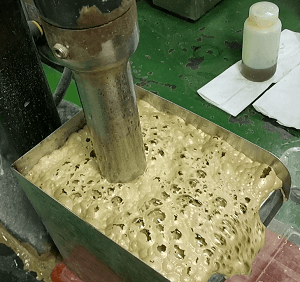Flotation tests are used to evaluate a materials amenability to froth flotation processing. 911 Metallurgy can provide you with the flotation processing test work that you need, at both the laboratory and pilot plant scale.
What is flotation?
Flotation is a process that is used to concentrate a constituent or remove a constituent by exploiting and manipulating the hydrophobic and hydrophilic properties of material.
Can my ore/material be floated?
Flotation can be used on a variety of ores including oxide, mixed, and sulfide ores. 911 Metallurgy specialists can help you determine if flotation is an effective processing strategy for your project. Our specialists have experience developing flotation strategies for various ore types including but not limited to ores that contain rare earth oxides, precious metals, base metals, and iron ore.
What is a flotation test?
A known amount of ore and water is added to create a slurry. Next, reagents are added to change the surface properties of the material. Then, chemicals called collectors are added to the slurry to form hydrophobic surfaces on the constituent of interest. Air or nitrogen is then bubbled through the agitated slurry. The air bubbles come into contact with the hydrophobic surfaces, transporting them to the surface, where they form a froth or foam. The foam is then separated from the pulp, creating a concentrate. The concentrate and tailings are then weighed, dried and assayed, to determine final constituent mass balances and recoveries. During the test, reagent additions are also tracked so that reagent consumption’s can be determined.
How do I optimize my flotation process?
911 Metallurgy helps you optimize your flotation process by considering important parameters such as grind size, reagent selection, reagent optimization, and kinetics. Our specialists have decades of experience running rougher, cleaner, kinetic, locked cycle, and pilot scale flotation tests.
